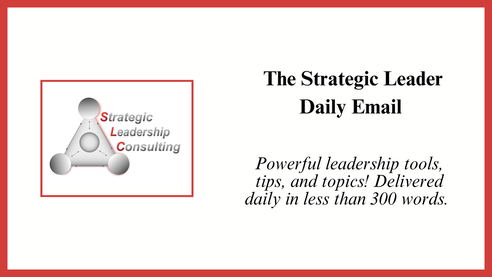|
Colleagues,
MVP: Visiting someone does not need to have an explicit purpose to still be valuable. "Whether it’s an informal visit, quick walkthrough, or formalized evaluation, it seems the scripting, logging and scribing with tablet or clipboard in hand is more the rule than the exception. I suggest something completely different that may be even more important—a visit just because." -Dr. Ryan Donlan, author of All Other Duties as Assigned Ryan is today’s guest on The Assistant Principal Podcast . We talk a lot about how to develop and grow the people around you. I loved this suggestion by Ryan to leave the tablet in the office and visit a teacher just because. This is an example of performative observation in which the leader is like a theater patron observing a performance for their own enjoyment and benefit. It also shows the visited person that you care. Cheers! Frederick
0 Comments
Colleagues,
MVP: Just because people are behind you, doesn’t mean you are a leader. “Being in the left lane of a superhighway with a string of cars behind you does not make you a leader. It may just mean you’re slow and too stupid to get out of the way.” -Dr. Jacque Jacobs, Mentor, Professor Emeritus, and so much more Today’s intention: Reflect on what leadership is and what makes you a leader? Cheers! Frederick Colleagues,
MVP: Less is more part 2: People can implement change better when the demands are smaller. When we focus on tasks, we focus on what needs to get done, and we consequently implement changes or efforts to complete the tasks. This is like stuffing as much into our backpacks as the backpacks will hold. When we focus on people, we focus on what is essential to support them. This is like using a smaller pack and putting only the essential things inside it. Focusing on people helps them move more quickly with less stress and trauma. Today’s intention: Meet with your mentor or another leader this afternoon. Discuss a change initiative that has bogged down. Identify the other change initiatives or pressures that have added weight to the change effort. Identify one thing to leave behind. Cheers! Frederick Colleagues,
MVP: Less is more – decrease the number of change initiatives you are implementing. I mentioned Monday that Pam and I will be doing a 260-mile hike this summer. This means that we need to carry everything that we will need (minus food) for 20-days on our backs! Every pound of pack weight adds eight pounds of force to the knees on each step. At about 2,000 steps per mile, each pound of pack weight creates over 7 tons of extra stress on our knees and feet! The challenge is that it is very easy to bring along items that may not be essential, but which are convenient. Furthermore, the line between convenient and essential can be difficult to distinguish. How many pairs of underwear do we need for a 20-day trip? 🤣 One strategy we have employed to help us be militant about keeping our pack wight low is to carry smaller packs. Smaller packs are lighter, and they make it more difficult to add in extra items. In considering change initiatives, we sometimes act like people have backpacks of unlimited size, so we engage in multiple initiatives at the same time. The result is a lot of extra stress. What if we took the smaller pack approach, and asked people to make fewer changes at one time? Today’s intention: What are some things you or your organization is asking people to do that is adding weight to their already full packs? Not sure? Ask them. 😉 Cheers! Frederick Colleagues,
MVP: Providing extra care to people before a big challenge is critical. During Christmas we were on the edge of the extreme cold and the temperatures were in the single digits and teens for over a week. The extreme cold was a great test for the plants in my greenhouse. The greenhouse is unheated, and even though I planted hearty greens, the temperatures were going to be too low to survive, so I covered the greens with multiple layers of clear plastic sheeting. Almost all the plants survived and are growing again. Albeit very slowly. Sometimes, a little extra care or special treatment can help a living thing survive or even thrive. Today’s intention: Who in your organization needs some extra care and support? How can you see that they receive it? Cheers! Frederick |
Categories
All
Archives
July 2024
|


 RSS Feed
RSS Feed